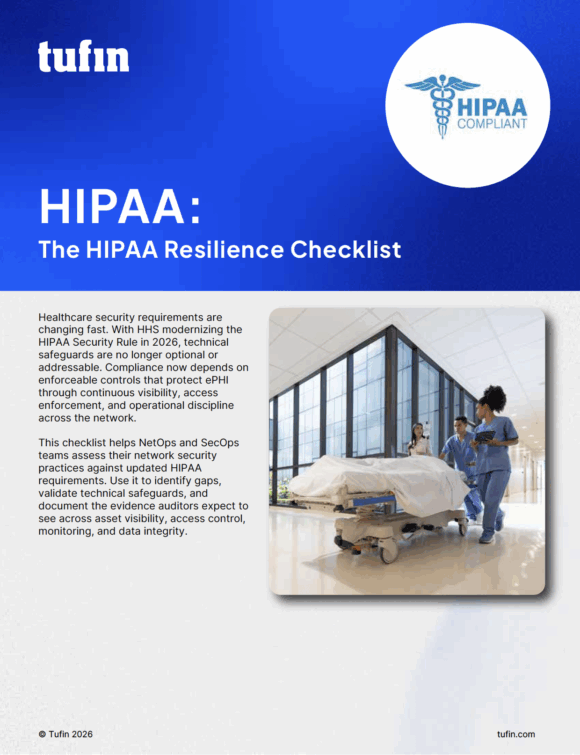
Health Insurance Portability and Accountability Act (HIPAA)
Assess your network against updated HIPAA requirements, validate technical safeguards, and simplify audit evidence collection.
What is HIPAA?
The Health Insurance Portability and Accountability Act (HIPAA) Security Rule establishes national standards to protect electronic Protected Health Information (ePHI). It applies to covered entities such as healthcare providers, health plans, and healthcare clearinghouses, as well as their business associates.
The goal of the Security Rule is to ensure the confidentiality, integrity, and availability of ePHI through appropriate administrative, physical, and technical safeguards. While administrative and physical safeguards focus on policy and facility-level controls, the technical safeguards define the security measures required for systems and networks that handle ePHI.
Covered entities must implement these safeguards in a way that is reasonable and appropriate for the size and complexity of their organization. The technical safeguards in particular outline standards related to access control, audit logging, system integrity, authentication, and secure transmission.
Need to strengthen HIPAA compliance at the network level? See how Tufin helps you enforce technical safeguards and document every change. Request a Demo!
HIPAA Requirements
The HIPAA Security Rule includes five Technical Safeguards. These are specific to the technology and policies used to protect ePHI. Tufin provides capabilities to help organizations implement, manage, and document controls related to these safeguards at the network layer.
Access Control (Required)
Organizations must implement technical policies and procedures that restrict access to ePHI to only those individuals or systems with appropriate permissions. This includes enforcing least-privilege access and segmenting sensitive systems.
Audit Controls (Required)
Covered entities must implement mechanisms to record and examine activity in systems that contain or use ePHI. This includes logging all access control changes and reviewing them for potential security issues.
Integrity (Required)
Organizations must put safeguards in place to ensure ePHI is not altered or destroyed in an unauthorized manner. This includes managing how and when changes are made to access policies.
Authentication (Required)
Procedures must be in place to verify that users seeking access to ePHI are who they claim to be. This includes controlling and validating access paths to systems where ePHI resides.
Transmission Security (Addressable)
Organizations must protect ePHI when it is transmitted over electronic communications networks. This includes using secure protocols to prevent interception.
Tufin and HIPAA Compliance
With Tufin, you can implement and enforce technical safeguards for HIPAA compliance across your hybrid network. You can control which groups and assets can access systems containing ePHI, validate all changes to firewall policies, and produce audit-ready documentation.
Restrict access to systems based on job role and business need
With Tufin, define secure zones for systems that handle ePHI and control which other systems are allowed to communicate with controlled segments of the network. Tufin provides visibility into every access path related to those systems. Tufin’s Unified Security Policy can help you define HIPAA compliant network access controls.
You can enforce least-privilege access by cleaning up and optimizing firewall rules. Overly permissive, unused, or redundant rules can be identified and removed. You can also use zone-based policy definitions to ensure that sensitive systems remain isolated.
These capabilities support HIPAA’s requirement to limit access to only those with a documented business need.
Monitor and validate every policy change
Tufin captures a complete history of every change to your firewall, router, and cloud access policies. Each change is logged with details on who made the modifcation, when it occurred, and what elements were modified.
You can simulate the impact of a proposed change before it is made and receive alerts if non-compliant access paths to ePHI systems are inadvertently configured on the network. This ensures all changes are approved, documented, and compliant before implementation.
This gives you control over the compliance of your security policies and a comprehensive audit trail for investigations or assessments.
Control access pathways and enforce secure transmission
Tufin allows you to define global access policies that prevent unauthorized traffic from reaching sensitive systems. These policies can specify which protocols and encryption standards must be used for network communications involving ePHI. By managing compliance at the firewall level, Tufin supports Layer 3 infrastructure for secure transmission, storage, and access paths to sensitive data.
Tufin helps you plan and implement technical policies to safeguard ePHI data, and audit the use of risky or contraindicated ports and services.
Maintain a continuous state of audit readiness
Tufin allows you to demonstrate that technical safeguards are clearly defined and maintained over time. You can generate reports that show exactly how the network is segmented, access is controlled, how changes are administered and reviewed, all while policies are maintained across the network.

Is your network HIPAA-ready?
Download the checklist to validate technical safeguards and document auditor-ready evidence.
Tufin Capabilities Mapped to HIPAA
| HIPAA Safeguard | Requirement | Tufin Capability | Compliance Outcome |
|---|---|---|---|
| Access Control | Restrict system access | SecureTrack, USP | Limit ePHI access to authorized users and systems |
| Audit Controls | Track access activity | SecureTrack Audit Trail | Record and examine every change to access rules across the network |
| Integrity | Prevent unauthorized change | SecureChange Simulation | Identify, approve, and validate all policy changes |
| Authentication | Verify access attempts | SecureTrack Enforcement | Enforce trusted access paths to systems with sensitive data |
| Transmission Security | Protect data in transit | Firewall Rule Enforcement | Avoid the use of risky ports and services; block all access that isn’t explicitly authorized |
Want to simplify HIPAA audits and improve access control?
Tufin helps you prove that safeguards are enforced across your network.
